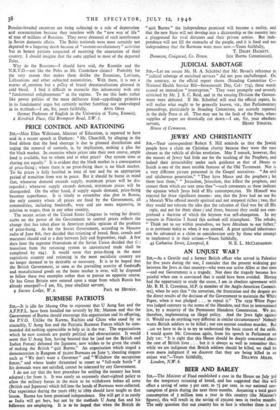PRICE CONTROL AND RATIONING
Snt,—Miss Ellen Wilkinson, Minister of Education, is reported to have said in a recent speech at Dtirham: " Mr. Churchill, by alleging in the food debate that the food shortage is due to planned distribution and urging the removal of controls, is, by implication, making a plea for the black market. In countries where prices take their own course, ample food is available, but to whom and at what price? Our system aims at sharing out equally." It is evident that the black market is a consequence of price-fuzing ; where there is no price-fixing there is no black market. To fix prices is fully justified in time of war and for an appropriate period of transition from war to peace. But it should be borne in mind that, whenever demand exceeds supply, maximum prices will be dis- regarded ; whenever supply exceeds demand, minimum prices will be disregarded. On the other hand, if supply equals demand, price-fixing becomes superfluous. It is timely to remember also that in Russia, the only country where all prices are fixed by the Government, all commodities, including foodstuffs, were and are more expensive, in relation to wages, than in any other country. The recent action of the United States Congress in voting for drastic curbs on the power of the Government to control prices reflects the change that has taken place in American public opinion of the problem of price-fixing. As for the Soviet Government, according to Moscow radio of June 8th, they decided that rationing of bread, flour, cereals and macaroni should end at a date between July and September, 1946. A few days later the supreme Praesidium of the Soviet Union decided that thz transition from the rationing system to unrestricted trade shall be completed by 5947. It would seem that price-fixing in the -most capitalistic country and rationing in the most socialistic country are no longer deemed to be desirable or necessary. It is to be hoped that the British Government, as soon as the prevailing scarcity of foodstuffs and manufactured goods on the home market is over, will be disposed to follow these two examples rather than to pursue an opposite course. Or has Great Britain now entered upon a stage from which Russia has already emerged?—I am, Sir, your obedient servant,






























 Previous page
Previous page